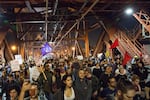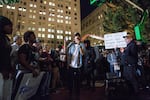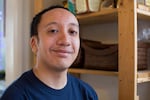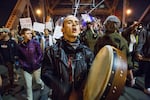
A third night of protests took place in Portland on Nov. 10, 2016, as crowds demonstrated against the election of Donald Trump as well as other issues.
Bradley W. Parks / OPB
From the banks of the Willamette River, people launched fireworks as thousands of protesters marched across Portland’s Broadway Bridge. It was the Thursday after Donald Trump won a historic presidential election. A few brave demonstrators and photographers climbed the bridge’s rungs to get an overhead view of the swarm.
Portland attracted national attention for its demonstrations after Trump's election; the Associated Press called Oregon the "epicenter" of anti-Trump activity with thousands of protesters flooding city streets.
Friday, Trump becomes the 45th president of the United States.
And protesters who made Portland's Resistance national news in the fall will be back in the streets to loudly proclaim Trump is still "not their president."
An Emotional Outlet
Kristen Kennedy and Spencer Foxworth marched on the Thursday following Trump’s election. It was the couple’s first time publicly demonstrating since the invasion of Iraq in the early 2000s.
Kennedy works with school teachers at a nonprofit while Foxworth works for an advertising agency. They’ve lived in Portland for about six years after moving from New York City. In that time, they’ve witnessed rising rent prices, self-segregating neighborhoods and economic development in Portland. For Foxworth, the election forced him to rethink how he can help make change.
“The question I kept asking myself and we kept asking each other is: How do we as ordinary people activate?” he said. “And not knowing how to do that, how do we ramp up and train ourselves to be heard in a way that we aren’t accustomed to being heard? How do we participate in democracy in a way that is beyond just voting every four years?”

Kristen Kennedy and Spencer Foxworth in November 2016. "Arguably, I feel as though I could build a pretty convincing argument that this is not the world that most of us want to be in," Foxworth said of Trump's election. "Let’s change that. Let’s make this sense of abnormality part of our lives and bring it back to the way things should be: inclusive and empathetic.”
Bradley W. Parks / OPB
Kennedy said fear about what a Trump presidency would look like mounted for her over the course of several months. She backed President Barack Obama in 2008 and 2012, but felt like she could have supported GOP challengers John McCain or Mitt Romney had either won.
“Obama’s opponents in the last two elections were reasonable people, who were responsible, who were well prepared for the job, who I disagreed with,” she said. “That is a completely different scenario than what we have now.”
When the election results came in, protest became an outlet for Kennedy and her husband.
“It took the immediate anxiety we had been feeling over the past several days and it gave it a direction,” Foxworth said, adding, “It gave us 4,000 other people to be among who I felt like were learning something from this experience.”
The Power Of Protest
Danny Robbins, an IT professional, was standing on the Burnside Bridge on the day after the election, watching protesters march on Interstate 5 beneath him. He had never participated in a protest before, and said watching such a large march was “powerful.”
“There was a black woman on the bridge passing along with me, who stopped and looked down,” Robbins recalled. “And she said, ‘It’s sweet, but [Trump]’s already won.’
“And so that made me think, 'What are the goals of these people? What goals should people have right now? What goals should people focus on?' It made me think about my goals,” Robbins said.
![Danny Robbins in November 2016. "A lot of people don’t think they have agency," he said. "And sometimes just something as simple as walking through the streets like that with thousands and thousands of other people [can restore that]."](https://opb-opb-prod.cdn.arcpublishing.com/resizer/v2/QGTVJJKGLVDPJLPMCCZXIZI6IQ.jpg?auth=9604b9ae5e9c1b5ca28ea134b6baa38aec18f19bde5424890290d3084d3a18d3&width=150)
Danny Robbins in November 2016. "A lot of people don’t think they have agency," he said. "And sometimes just something as simple as walking through the streets like that with thousands and thousands of other people [can restore that]."
Bradley W. Parks / OPB
But after three days of marches through city streets and the resulting property damage, city officials urged protesters to give it a rest.
The demonstrations remained largely peaceful, but an offshoot of protesters had smashed storefronts and vandalized cars in the city. Portland police declared the Nov. 10 demonstration a "riot," estimating property damage in excess of $1 million. More than 100 people were arrested.
Then-Portland Mayor Charlie Hales voiced frustration on OPB's "Morning Edition," saying he doesn't think that protest in and of itself creates change.
“Sorry, you don’t make change through protest,” Hales said. “You make change through doing the hard work of democracy. I’ve been encouraging people that if you’re concerned, get to work.”
Robbins didn't fully buy the mayor's argument. He pointed to Portland's recent police contract dispute, which marked a clear divide between protesters and City Hall. Robbins thought Hales attempted to squash public input on the contract.
“If you are encouraging other forms of activism and other forms of community involvement in civics and local law, that means you have to pay attention to what your constituents want,” Robbins said.
Hales faced sharp criticism for his denunciation of the anti-Trump protests. The American Civil Liberties Union of Oregon issued a pointed rebuke of Hales' remarks.
“[P]lease, Mr. Mayor, do not dismiss the protests,” the ACLU of Oregon wrote in an open letter to Hales. “Empathize with your constituents’ fears, and if you cannot give them hope for change, at least respect their right to ask for it.”
Hales even planned, announced and promptly canceled a public march of his own, facing a counter-protest.

Portland's Resistance spokespeople Gregory McKelvey and Kathryn Stevens prep ahead of a rally on Sunday, Nov. 13, 2016.
Bryan M. Vance / OPB
‘Support With Structure’
Immediately after the election, activists felt a sense of urgency to not only protest but organize as well, especially with Portland in the national spotlight.
Well-known Portland activist groups like Don't Shoot Portland and Portland Tenants United quickly formed a coalition called Portland’s Resistance.
There's a sense among Portland activist groups that Donald Trump poses a threat to their collective vision of the city's future — one that is inclusive, fair and welcoming.
Their combined organizing capacity helped draw thousands to the streets for a week straight last November.
One of the leaders of Portland's Resistance is Gregory McKelvey, also a lead organizer of Don’t Shoot Portland. The charismatic Lewis & Clark College law student is often seen at the front of marches through Portland streets with a loudspeaker in hand.
McKelvey said he and other organizers saw an opportunity to capitalize on anti-Trump fervor.
"We understood that people were going to be in the streets no matter what," he told Dave Miller on OPB's "Think Out Loud." "We elected a candidate of chaos, so there was going to be chaos."

A third night of protests took place in Portland on Nov. 10, 2016, as crowds demonstrated against the election of Donald Trump as well as other issues.
Bradley W. Parks / OPB
Portland’s Resistance found it important to “support with structure” to maintain peace at demonstrations, McKelvey said. The splintering of post-election protests that led to arrests, property damage, and even the shooting of one demonstrator illustrates how difficult high-level organizing can be.
But McKelvey looks at those few instances of violence as opportunities for growth.
“We need to not just lead by example and condemn the violence and destruction, but also talk and think about why about why those people feel unheard,” he said, “and how we can channel their voices into a constructive manner.”
Portland's Resistance organizers made clear when announcing their movement, though, that they wanted to be much more than an anti-Trump group. The group outlined a number of causes for which it plans to fight, including rent control, increased protection for Portland's houseless population, and combating police brutality.
People like Patrick Garrison, a recent graduate of the University of Portland who now works full-time in the Swan Island industrial district, are searching for actions to take outside of marching.
Garrison participated in multiple demonstrations after the election.
“Protests are an important part of it — a very, very important part of it,” he said. “But I also don’t want to lose sight that we can’t just march for weeks on end and not figure out exact policies that we want.”

Patrick Garrison in November 2016.
Bradley W. Parks / OPB
In college, Garrison joined others in demanding the Catholic university add sexual orientation to its non-discrimination policy. (It did.) He and others also staged pro-choice counter-protests to campus anti-abortion advocates.
Garrison likened activism to the obscure sport of chessboxing in which athletes play a round of chess, then enter the ring for a round of boxing. He said public demonstrations are like boxing, whereas discussion and policy battles are more like chess.
“We can get in as many punches as we want in the ring, but it doesn’t mean anything if we end up checkmated on the board,” he said.
Some Portland institutions and public officials are already making chess moves to block some of Trump’s more controversial proposals. New Portland Mayor Ted Wheeler said the city would remain a “sanctuary city” for undocumented immigrants, regardless of consequences. Portland Public Schools said they will put hurdles between federal immigration officials and undocumented students.
Avoiding The Bubble
Portland has a history of standing up to conservative politicians and their platforms.
“We’re a proud liberal city,” Mayor Hales said in a press conference following the first week of protests.
Decades ago, Portland activists attempted to disrupt President George H.W. Bush and Vice President Dan Quayle. A member of the Bush administration is rumored to have dubbed Portland "Little Beirut" and the name stuck, according to lore.
A tall man wearing a red sweatshirt and a silver Mexican luchador wrestling mask was among the thousands protesting in the city after the election. He clutched a sign that read, "Little Beirut Lives." The luchador unearthed a piece of Portland's activist past that contributes to its present.
"Little Beirut" aimed to disrupt President Bush. Portland’s Resistance wants to take it to the incoming Trump Administration through protest and policy fights, organizer McKelvey said.
“From here we [Portland's Resistance] transition from just being a protest group to being a coalition of causes pushing for actual policy change locally in order to insulate ourselves from the policies of a Trump presidency,” McKelvey said in an email.

A third night of protests took place in Portland on Nov. 10, 2016, as crowds demonstrated against the election of Donald Trump as well as other issues.
Bradley W. Parks / OPB
But activists in Portland — and liberal cities like it — risk creating a bubble.
A full 41 percent of Oregon voters chose Donald Trump — and his opponents in the state divided on who would be a better fit than the incoming president.
“It’s on us to see patterns. We need to see the world as it really is,” said Foxworth, the advertising professional. He later added, “Our ability to ignore each other is going to shrink.”
Kennedy, the nonprofit worker and a Clinton supporter, said now is a time to connect with people she may not see eye-to-eye with.
“I want to try to find it in my heart to say, ‘How can I be attentive to that potential kind of pain that’s underneath that desire for things to change?’” she said. “Especially feeling as much pain as I’m feeling right now about the result of the election, it’s not hard to contact that. And I think that there’s a baseline for a conversation there.”
After the first week of post-election protests, numbers at rallies and marches waned as police containment efforts ramped up.
But Portland's Resistance drew a lot of attention and new followers that week.
As a result, demonstrations planned in Portland for Trump's inauguration could be some of the largest and loudest in the city's history.
